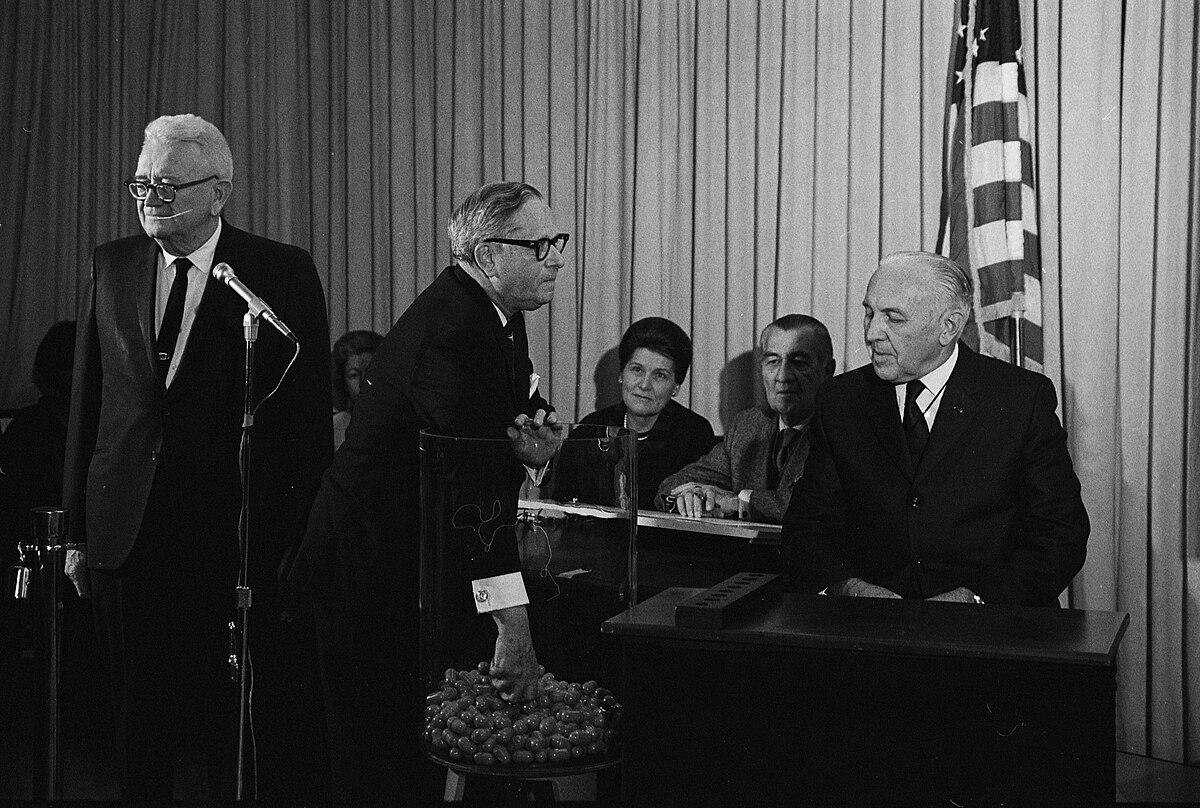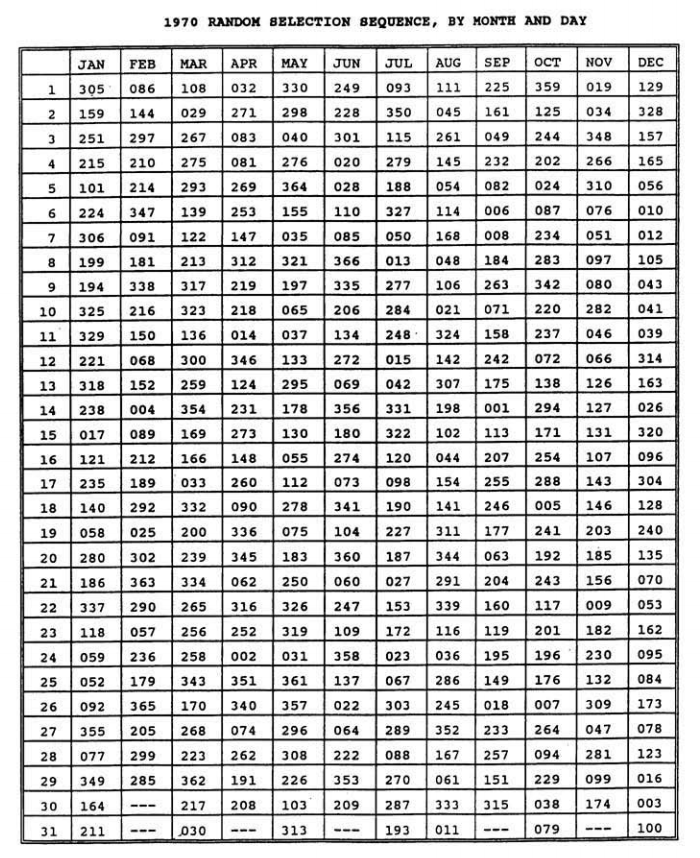What Was YOUR Draft Number?
Skimming through the Personal Essays as they came in last month, I noticed how many people commented on their “draft number.” The draft number was established by lottery at the Selective Service System on December 1, 1969. Here is the chart showing what the number was. (Use comments below to share what YOUR number meant to you.)



I was in a barracks in Newport, RI, ready to muster out of the Navy. Nixon’s “Vietnamization” of the War caught the Navy OCS with too many officers-in-training, and they offered us an Honorable Discharge if we quit. One catch: having served less than 6 months, we were still exposed to the draft.
Through luck, I had happened on a job in the New Haven Police, which was a deferable occupation. So, I quit the Navy to join the police. Then, I got another lucky break. Draft number 330. I didn’t really need the deferable job with NHPD. But I didn’t really have any other plans, and I was sick of school — so, I joined the force.
To this day I explain that resume item as “an alternative to the Vietnam War”. It’s not true, but it’s simpler to explain.
I was in NJ National Guard advanced infantry basic training at Ft. Gordon, Georgia. My number was 181, which at the Hackensack, NJ draft board would have sent me to certain death in Vietnam. I hadn’t been exactly enthusiastic or pleased about my decision to join the National Guard, but at that moment I realized I had made the right decision.
Does anyone remember the short-lived draft deferment examination? The SSA administered it; your score determined the length of your exemption. I thought it was a terrible, anti-democratic idea and I didn’t take it.
Local 99 in Evanston IL was not amused, and promptly reclassified me 1-A (this was at the beginning of our sophomore year). I still have that 1-A card. I appealed, and, highly motivated, I joined the 2-year NROTC program (beginning what was to be 30 years in the Navy).
The following fall, John Hersey asked me to help in counseling Pierson men on dealing with the SSA system, so I went to Hartford to interview General so-and-so, the head of CT’s Selective Service operation. As the interview closed I asked in passing what had happened to my appeal — I hadn’t heard anything. He took an hour or so to look into it, asked me back into his office, and told me that in fact, they had completely lost my file, and I never would have been drafted unless they somehow found it, which he thought very unlikely. I looked down at my midshipman uniform and said something under my breath which he was too discreet to ask me to repeat….
I remember protests in Fall of sophomore year, but the only mention I see in YDN wasn’t until December ’66. See p. 4 of http://digital.library.yale.edu/cdm/compoundobject/collection/yale-ydn/id/54270/rec/1
I had joined the Naval Reserve in 1966, thanks to early cancellation of student deferments by my local draft board. I had been on active duty since July of 1969 and was stationed in Pensacola at the time of the first lottery. I don’t remember even bothering to check my number (221).
After graduating I went to work in DC as an intern for the USIA, working at the Voice of America. The summer internship carried a deferment. While living in DC I put myself on the waiting list for the DC Army National Guard. They had an exceptionally short waiting list because they kept getting called to active duty, first for the race riots of ’68 and then for the big anti-war demonstrations at the Pentagon.
In the fall I took off for Germany and lived in Munich, attending lectures in Sociology, Political Science, and Germanistik at the University there. In December I got a phone call from my brother, telling me that they were going to do a lottery, and by the way, your notice came in from the NG that you could report for duty in January 1970. On the day of the lottery, I spent hours trying to learn what number had been drawn for my birthday, July 21st. The newspapers, the Armed Forces network, the embassy–all knew that a lottery drawing had taken place, but nobody in Germany knew the actual outcomes. The next day I heard back from my brother: I had drawn number 27 and was certain to be drafted. I sold my bike, said goodbye to my friends, and was back in DC before Christmas, and took the oath in early January.
After finishing basic and AIT as an MP, I spent one weekend at the DC armory. There was a big Cambodia demonstration that weekend, and my unit was on active alert, but they hadn’t issued me any equipment yet, so I just hung at the armory and did KP. Right after that, I moved to Chicago to attend grad school and transferred into the Illinois National Guard, where I did my six years of reserve duty with an artillery unit near the University.
I was premed until senior year when I decided to go to law school. Hedging against the lottery I also applied to medical school and was about to choose Harvard Law over Yale Med when I drew #86. Went to med school instead!
My number meant that if I never win another lottery again, it’s just fine: 359.
I was a happy no. 261. But I had already flunked the physical so it didn’t make any difference.
I do not recall what my status was: 1-A? or 2-A, whatever pre-med was. And, I do not remember how I designated pre-med. Then, with the lottery, pre-med went away. Admittedly, those recollections are fuzzy. Anyway, I recall having pulled 155 in a town of about 50,000, and was sure I was going to be drafted as soon as I graduated. Then, to my amazement, they moved the draft board from my town of Montclair to Newark, NJ, a much bigger pool of eligibles.
Moving ahead many years, I know my son had to register with selective service when he turned 18, but the draft was over. Do young men still have to register? What about women? (Careful what you wish for.)
Forty-nine years ago confusion reigned. At our Trumbull graduation ceremony under a beautiful blue sky the Beatles’ Get Back blared from a dorm window. My folks and I met Chuck Resor’s dad (gulp) Secretary of the Army Stan Resor. I had seriously considered divinity school, then applied to Harvard MAT for teaching – rejected. No problem, I was sick of school. Took the LSAT because everyone did. Applied for CO status and got it, although that probably would have led to non-combat duty – would I go and still support the war? Went with roommates to Cape Cod and raked sea moss (carrageenan). Grandmother died; JoJo went home. Applied to my hone town police department and rejected due to wearing glasses. Accepted to the Peace Corps and had airline tix to Colombia as an agricultural specialist but didn’t go because I felt I was “just” avoiding the draft (not sure this or anything else made sense – I wish I had gone); thereby wasted the tax dollars spent in FBI interviews of my neighbors, etc. Started a “career” slinging trash into the back of a residential “2R” garbage truck; got a great tan and a 32” waist. Then: lottery #217. Started in a personnel job, worked with the first lawyer I’d ever met, reached back and cashed in on the LSAT. A few years later had an emergency appendectomy and when the nurse, whose brother had been in Vietnam, was checking me in for ID (“what does this CO card mean here in your wallet?”), I had a surgery prep injection using the biggest needle I had ever seen.
As a foreign student I was exempt from the draft — unless I got married to a US citizen. Thanks to my lottery number of 363, I cheerfully registered for the draft after Bess and I were married in 1971. As we approach our Golden Anniversary, it is the only thing for which I can thank Richard Nixon!
My lottery number was #221. However, that was moot because by that time I was already in the Army stationed at Ft. Myers, Va. I had enlisted in New Haven in early July of 1969 to have a choice of how I served. I also received a draft notice that month so there was no escaping. Anyway, I learned Vietnamese at the Army Language School in DC and served in Danang, Vietnam for a year (2001- 2002) in Army Intelligence. Left Vietnam in Jan, 2002. In March of that year, the NVA launched their March Offensive which overran a portion of the northern part of South Vietnam. So the timing for me was good. I also got let out of the Army 6 months early because they have no need for Vietnamese speakers Stateside. I never regretted my decision to join the Army because it gave me a sense of direction and I learned to get along with folks from all walks of life.
I was accepted to go to Grad school at State University New York in Buffalo to go study with Yale Prof. Robert Rosin who had left Yale for Buffalo my senior year. But, my draft board said that if I went to Grad school I would get a 1-A classification.
Being the cautious sort, right after graduation, I started work as a civilian computer scientist at the U.S. Navy Underwater Sound Laboratory, just a half hour east of New Haven, in New London, CT. For being employed in this lab, I received a 2-A deferment.
Working in this Navy Lab was a little strange especially after I grew a beard, and would come to work Monday talking to my largely veteran fellow workers about the protest rally I attended in New Haven the previous weekend. They grew to like me, but I always felt I was walking a tightrope when I worked there.
Soon after starting, I received my lottery number — 245. That sounded pretty good, but again being cautious, I waited until December 20, 1970 before I called my draft board to find out what number they had reached. 150 was the answer. Looked even better, because in order to avoid being drafted, you had to be 1-A at the end of any calendar year. So, for 10 days at the end of 1970 I was 1-A.
In the fall of 1970 I had applied for Grad School at MIT, was accepted and the rest is history.
So, like others, I have a curious appreciation for General Hershey — he “channeled” me to work for the U.S. Navy and postpone going to Grad school in 1969 at SUNY Buffalo. I ended up entering Grad school at MIT in 1971.
My number was 52…cannon fodder. I scrambled to find an Army Reserve Unit in central Indiana, joined, and headed off to Basic and Infantry AIT at Ft. Ord, CA and Ft. Polk, LA. The Army and I were never a good match.